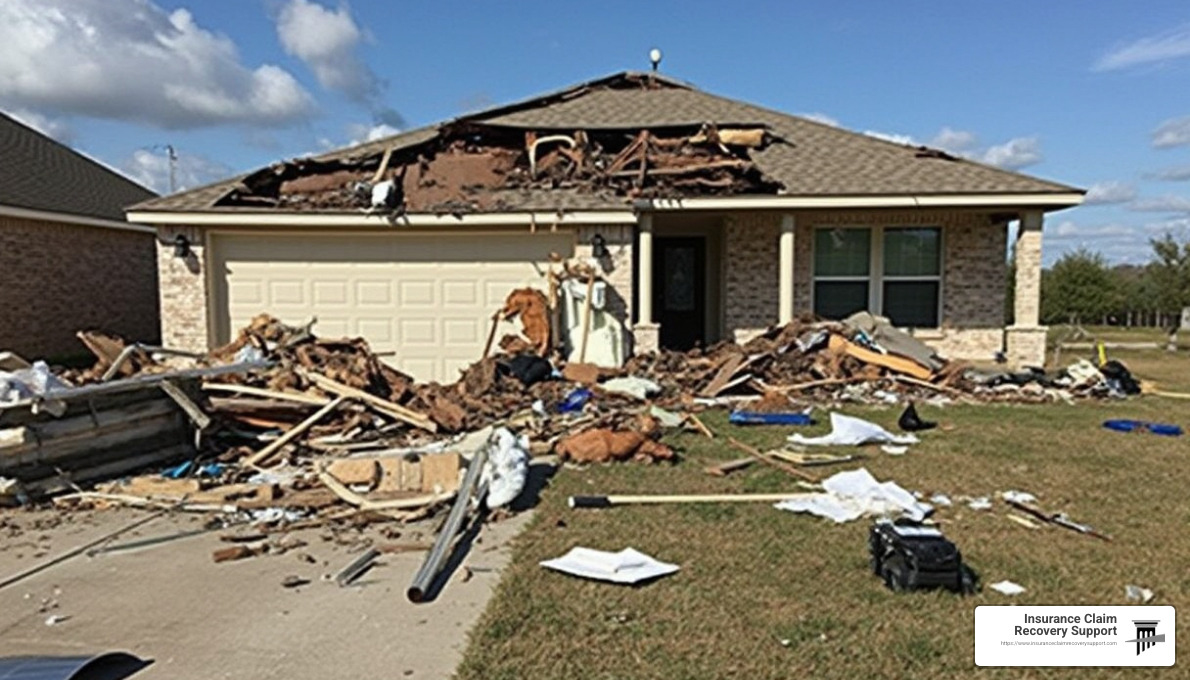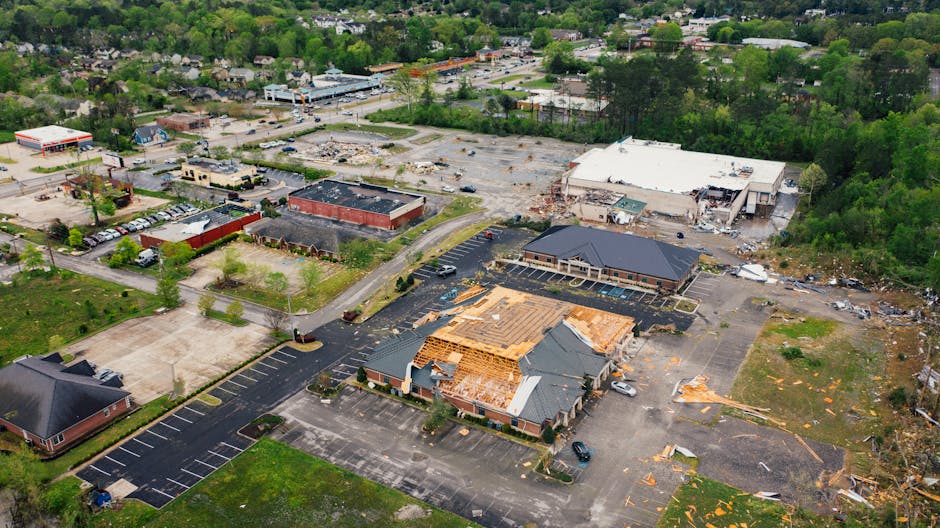Attorneys fees in property damages texas can be a complex issue, especially for those dealing with the aftermath of severe weather events like hurricanes, tornadoes, or floods. In Texas, recovering attorney’s fees associated with property damages isn’t always straightforward and often depends on specific legal criteria and statutes. Typically, these fees aren’t recoverable in tort cases, such as personal injury, unless a statute explicitly allows it. However, there are situations where attorney fees can be recovered, particularly in contractual disputes or certain statutory claims.
If you are facing property damages in Texas and considering legal action, here are a few essential points to keep in mind:
- In most cases, attorney’s fees are not automatically recoverable. You’ll need to carefully check the statutes that apply to your situation.
- Court costs are separate from attorney’s fees, and usually, the losing party is asked to pay these costs.
- Exceptions do exist, where you might recover attorney’s fees—such as certain breach of contract claims.
- Conduct a cost-benefit analysis before proceeding with legal action to ensure it’s financially viable.
Understanding the nuances of attorneys fees in property damages texas can be essential to navigating your case effectively and ensuring you don’t face unexpected financial burdens.
As an expert with experience in handling over $250,000,000 in large loss claims, I, Scott Friedson, have helped numerous clients steer the complexities of property damage claims in Texas, ensuring they receive fair settlements without unnecessary delays or litigation.
Understanding Attorney Fees in Texas
In Texas, the concept of attorney fees can be a bit tricky due to the American Rule. This rule generally states that each party in a lawsuit pays for their own attorney fees, regardless of who wins the case. But, as with many rules, there are some exceptions, especially when it comes to property damage claims.
The American Rule
Under the American Rule, each party is responsible for their own legal costs. This means that even if you win your case, you might still end up paying your attorney out of pocket. However, there are specific statutes in Texas that allow for the recovery of these fees in certain situations, such as breach of contract cases, where the law explicitly permits it.
Compensatory Damages
Attorney fees are generally not considered compensatory damages. Compensatory damages are meant to cover the actual loss suffered, such as repairing your property or replacing damaged items. Attorney fees, on the other hand, are the cost of hiring a lawyer to help you with your legal battle. However, in some cases, like those involving fraud or deceptive trade practices, Texas law may allow for attorney fees to be included as part of the damages awarded to the prevailing party.
What Makes a Fee Reasonable?
Determining what constitutes reasonable fees is crucial. According to the American Bar Association, factors like the time and effort required, the complexity of the case, and the customary fees in the area all play a role in deciding if an attorney’s fees are reasonable. Courts will often look at these factors to ensure that the fees charged are fair and justifiable.
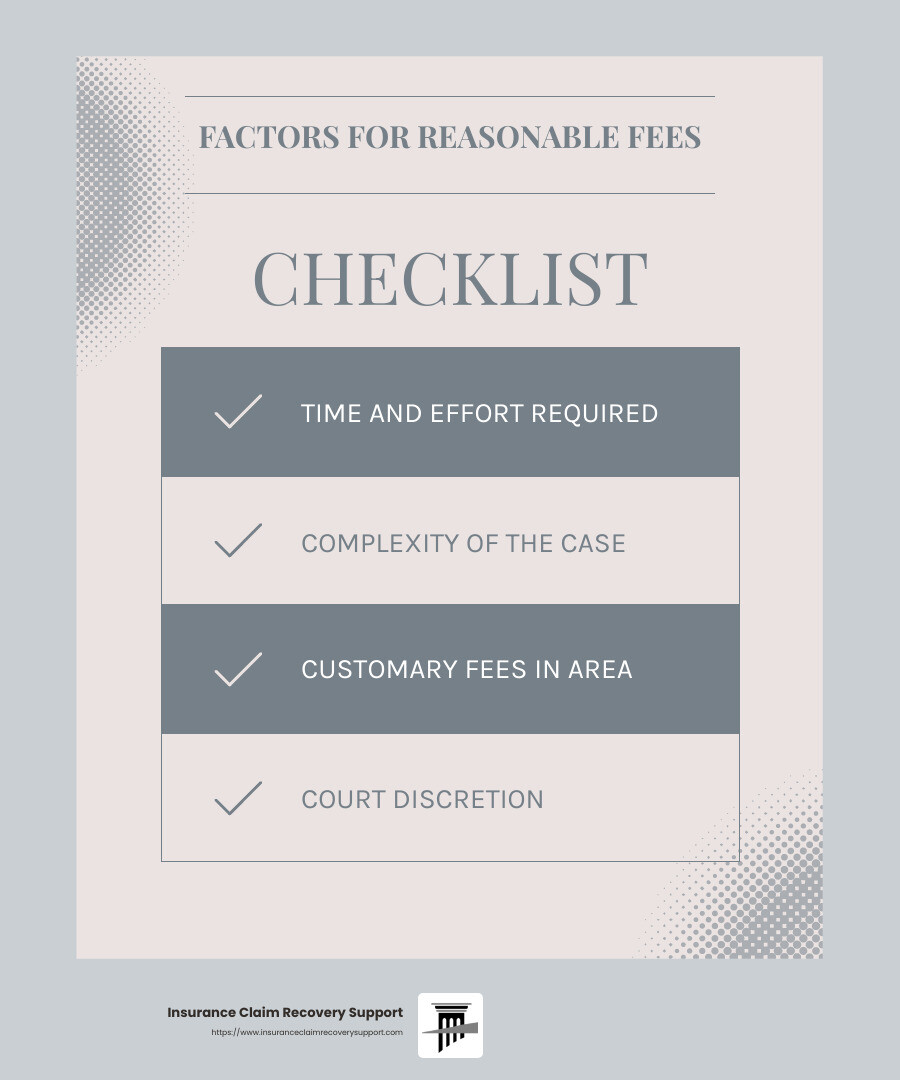
When dealing with property damage claims, understanding these nuances can help you make informed decisions about pursuing legal action and managing your financial commitments effectively.
This leads us to explore when attorney fees might actually be recoverable, which can make a significant difference in how you approach your property damage case in Texas.
When Are Attorney Fees Recoverable?
In Texas, recovering attorney fees in property damage cases isn’t straightforward. The Texas Civil Practice and Remedies Code Section 38.001 outlines specific circumstances where attorney fees can be recovered, primarily focusing on breach of contract claims.
Texas Statutes
Texas law provides opportunities to recover attorney fees through certain statutes. For instance, under Section 38.001, a prevailing party in a breach of contract case may recover attorney fees, but this is not a blanket rule for all property damage claims. The fees must be explicitly allowed by law or contract.
However, statutes like the Deceptive Trade Practices Act (DTPA) also allow for recovery of attorney fees in cases involving fraud or deceptive practices, which might involve property damage scenarios.
Breach of Contract
One of the most common situations where attorney fees are recoverable is in cases of breach of contract. If a property damage claim arises from a contractual agreement—like a construction contract—attorney fees may be awarded to the winning party. It’s vital to note that this does not create new grounds for a lawsuit but applies when there’s an existing breach.
Procedural Requirements
To recover attorney fees in Texas, certain procedural requirements must be met. First, the claim for attorney fees should be included in the initial pleadings. The opposing party must also be notified of the claim and given an opportunity to settle. If a party fails to pay a claim within 30 days after it is presented, the claimant may seek to recover both the claim amount and attorney fees.
In addition, the court will consider whether the fees are reasonable. This involves looking at the time and labor required, the difficulty of the issues involved, and the customary fees for similar legal services. The opposing party can challenge the reasonableness of the fees, which could affect the amount recoverable.
Understanding these statutes and procedural requirements is crucial in determining whether pursuing a claim for attorney fees in a property damage case is feasible. Knowing when these fees are recoverable can greatly influence your legal strategy and financial planning.
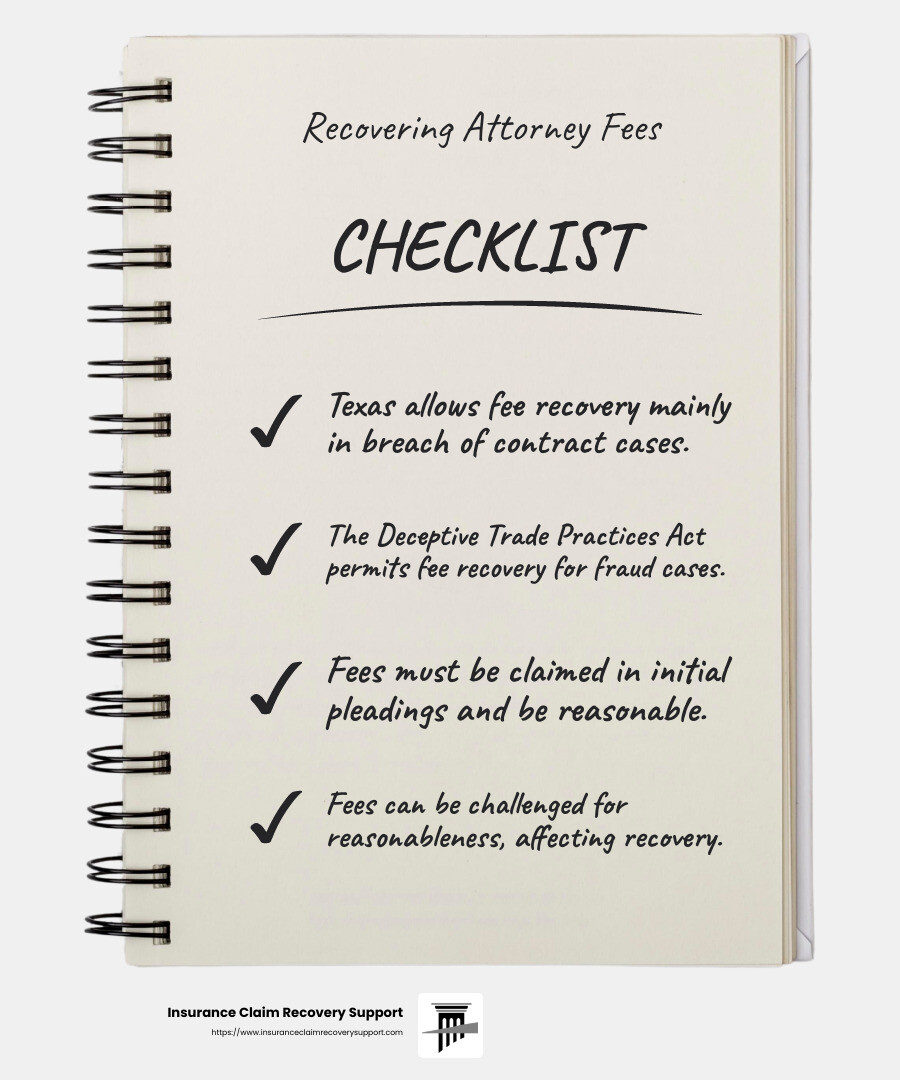
Next, we will dig into how various factors can influence the amount of attorney fees, including market value, the time and effort involved, and court discretion.
Attorneys Fees in Property Damages Texas
Navigating the complexities of attorneys fees in property damages Texas can be daunting. Property damage claims often come with a maze of legal representation and cost recovery challenges. Let’s break it down.
Property Damage Claims
When your property suffers damage, whether from a storm or other events, filing a claim is often the first step. However, understanding whether you can recover attorney fees in the process is crucial. Generally, attorney fees are not automatically recoverable in tort actions, like personal injury or property damage, unless a specific statute allows it. This means that in many property damage cases, unless you have a contractual agreement or are covered under specific statutes like the Deceptive Trade Practices Act (DTPA), you might have to bear your own legal costs.
Legal Representation
Choosing the right legal representation can significantly impact your property damage case. A skilled attorney can steer the intricacies of Texas law, helping to identify opportunities for fee recovery. For instance, if your property damage claim involves a breach of contract, such as issues with a construction contract, Texas law under Section 38.001 might allow for the recovery of attorney fees. This is contingent on the fees being reasonable and the claim being presented correctly.
Cost Recovery
Recovering costs in property damage cases involves more than just the damages themselves. Court costs and attorney fees can quickly add up, making it essential to understand the financial implications before proceeding. In Texas, if you are successful in your claim, the opposing party might be required to cover your attorney fees, provided the claim meets specific statutory or contractual criteria. However, this is not guaranteed and often depends on the specifics of the case and the court’s discretion.
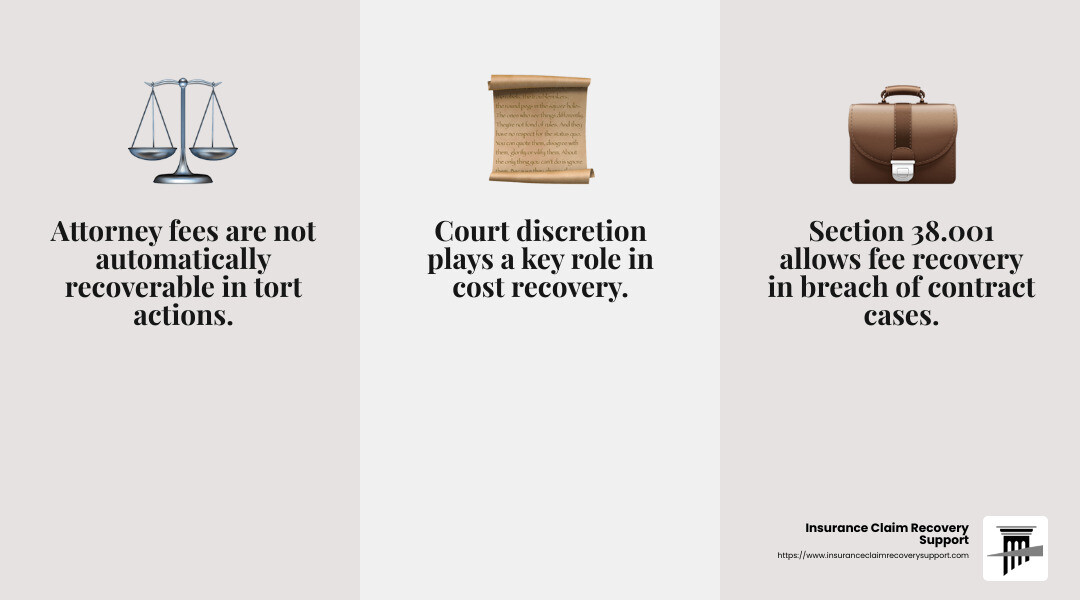
In summary, while pursuing a property damage claim in Texas, it’s important to consider the potential for recovering attorney fees. This involves understanding the legal context, choosing the right representation, and strategically planning for cost recovery. Next, we will explore the factors that influence the amount of attorney fees, such as market value, time and effort, and court discretion.
Factors Influencing Attorney Fees
Understanding what drives the cost of attorney fees in property damage cases in Texas can help you make informed decisions. Here’s a breakdown of the key factors:
Market Value
The market value of legal services varies based on location and the complexity of the case. In cities like Austin and Houston, where the legal market is competitive, fees might be higher compared to smaller towns like San Angelo or Amarillo.
Attorneys often set their rates based on what is customary in their area. For instance, in the busy legal hub of Dallas-Fort Worth, you might find higher rates due to the demand for specialized legal expertise.
Time and Effort
The time and effort required for your case are major determinants of attorney fees. Simple cases with clear-cut facts might require less time, resulting in lower fees. Conversely, complex cases involving multiple parties or intricate legal issues can take more time and effort, increasing the cost.
Attorneys often track their hours carefully, billing for time spent on research, court appearances, and negotiations. This is why detailed time records are crucial, as they justify the fees charged.
Court Discretion
In some cases, the court’s discretion plays a significant role in determining attorney fees. Courts may consider factors like the complexity of the case, the results obtained, and the conduct of the parties involved.
For example, if a case involves bad faith actions by the opposing party, a court might be more inclined to award attorney fees to the prevailing party. However, this is not a given and can vary from one judge to another.
In Texas, the Arthur Andersen factors guide courts in assessing the reasonableness of attorney fees. These include the time and labor required, the skill needed, and the customary fee for similar services.
Understanding these factors can help you anticipate the potential costs involved in a property damage claim. In the next section, we’ll tackle some frequently asked questions about attorney fees in Texas property damage cases.
Frequently Asked Questions about Attorney Fees in Texas Property Damage
What is the American Rule for Attorney Fees in Texas?
The American Rule is a fundamental principle in the U.S. legal system, including Texas. It states that each party involved in a lawsuit is responsible for paying their own attorney fees, regardless of the case’s outcome. This means that even if you win your property damage case, you typically cannot recover your attorney fees from the losing party.
However, there are exceptions. For instance, if a contract or statute specifically allows for the recovery of attorney fees, the prevailing party may be able to claim these costs. Texas law provides several such statutes, particularly in cases involving breach of contract or deceptive trade practices.
Are Attorney Fees Considered Compensatory Damages?
In Texas, attorney fees are generally not considered compensatory damages. Compensatory damages are meant to cover the actual loss or injury suffered by a party, such as property damage or medical expenses. Attorney fees, on the other hand, are seen as collateral litigation costs.
However, in breach of contract cases, Texas Civil Practice and Remedies Code § 38.001 allows the recovery of attorney fees in addition to compensatory damages. This means that if you win a breach of contract claim, you could recover both your actual damages and reasonable attorney fees, provided certain procedural requirements are met.
How Can One Recover Attorney Fees in Texas?
To recover attorney fees in Texas, you must follow specific legal procedures and meet statutory requirements. Here’s a simple breakdown:
-
Claim Presentation: In breach of contract cases, you must present your claim to the opposing party. This gives them a chance to resolve the issue before litigation.
-
Statutory Requirements: Ensure your claim falls under a statute that allows for attorney fee recovery. For example, the Texas Deceptive Trade Practices Act permits consumers to recover attorney fees if they prevail in a claim against a business for deceptive practices.
-
Court Approval: The court decides whether to award attorney fees. Factors like the complexity of the case, the conduct of the parties, and the results obtained can influence the court’s decision.
Understanding these steps is crucial for anyone looking to recover attorney fees in property damage cases in Texas. In the next section, we’ll explore the role of Insurance Claim Recovery Support in advocating for policyholders dealing with property damage.
Conclusion
Navigating the complexities of attorney fees in property damages Texas can be daunting, especially when dealing with the aftermath of severe weather events or other property damage incidents. At Insurance Claim Recovery Support, our mission is to stand by policyholders, ensuring they receive the maximum settlement they deserve. We understand the unique challenges faced by property owners in Texas, from Austin to Dallas, and beyond.
Policyholder Advocacy
Our focus is on advocating for policyholders. We work tirelessly to ensure that insurance companies fulfill their obligations, providing fair compensation for property damage claims. Whether it’s damage from hurricanes, floods, or other disasters, we are committed to guiding you through the claims process with expertise and dedication.
Texas Property Damage
Texas is no stranger to extreme weather events that can cause significant property damage. The legal landscape surrounding property damage claims can be complex, with specific statutes and procedural requirements impacting the recovery of attorney fees. We are here to simplify this process for you, ensuring that your rights are protected and that you receive the compensation you’re entitled to.
Partnering with us means you have a dedicated team on your side, advocating for your interests and navigating the intricacies of property damage claims in Texas. Let us help you steer the path to recovery with confidence and clarity.
For more information on how we can assist you with your insurance claim, visit our Texas Flood Property Damage Insurance Claim Tips for Policyholders.

